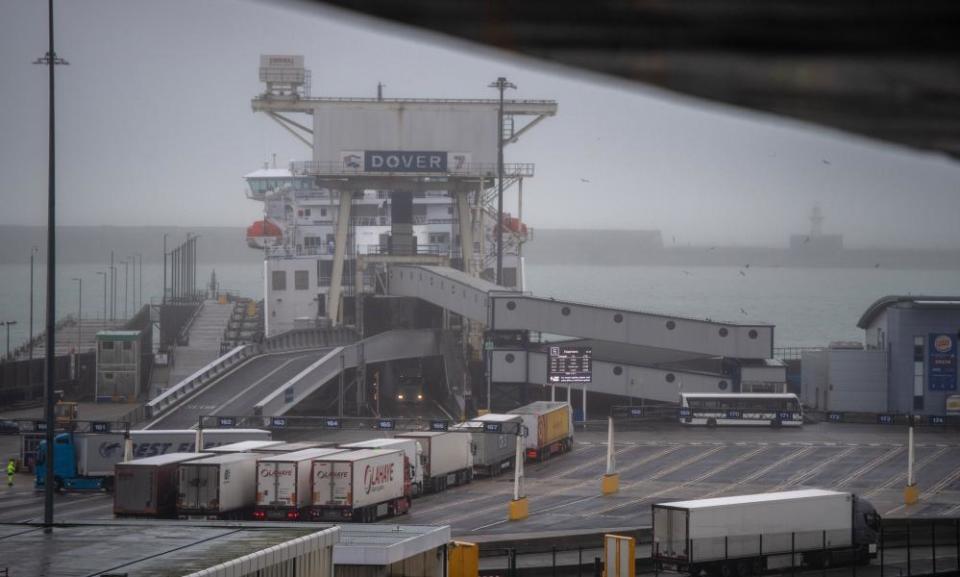Britain’s stalling economy blamed on inflation and product shortages

Last quarter survey of 2021 shows firms worried about raised interest rates, and cash flow and debt issues, prior to plan B Covid rules
Britain’s economic recovery stalled before the arrival of the Omicron variant of Covid and the dampening effect of the government’s plan B restrictions on consumer spending in the Christmas shopping period, a wide-ranging company survey has found.
Businesses blamed spiralling inflation and shortages of imported goods for a decline in sales in the fourth quarter, which meant that an expansion during the spring and summer ground to a halt.
In a message that will concern the chancellor, Rishi Sunak, the British Chambers of Commerce added that many respondents to its quarterly survey of almost 5,500 firms revealed that they were running low on cash and had ditched investment plans to stay afloat into the new year.
Suren Thiru, the BCC’s head of economics, said sales growth stalled as firms struggled with the “mounting headwinds” of inflation, a scarcity of skilled workers, and problems sourcing products from overseas.
“The persistent weakness in cash flow is troubling because it leaves businesses more exposed to the economic impact of Omicron, rising inflation and potential further restrictions,” he said.
The survey also found that the prospect of Bank of England officials raising interest rates was another concern for firms that had taken on extra debt over the last 20 months to cope with the pandemic. The bank raised rates to 0.25% in December.
A series of reports have shown the UK economy heading into a challenging spring, with a strong rise in consumer prices hitting household disposable incomes and denting consumer confidence.
Official figures showed the consumer prices index (CPI) jumped to 5.1% in November following persistent increases in oil and gas prices and other commodities, including wheat and copper.
Consumer spending has underpinned the recovery, accounting for more than 80% of the UK’s growth, while spending on government services such as the NHS has made up much of the difference.
Only a minority of businesses have pushed ahead with spending on new equipment, buildings and machinery, despite the offer of tax subsidies on investment, made in the budget last March.
In the second quarter of 2021 GDP growth hit 5.5%, but fell back to 1.3% in the third quarter. The BCC survey, which was conducted in the last week of November, indicated that the economy was on course to flatline in the fourth quarter.
It was likely the economy would contract in the first months of this year as the message to work from home and avoid large gatherings affected sales, Thiru said.
Thiru added: “The UK economy is starting 2022 facing some key challenges. The renewed reluctance among consumers to spend and staff shortages triggered by Omicron and plan B may mean that the UK economy contracts in the near term, particularly if more restrictions are needed.
“Rising inflation is likely to limit UK’s growth prospects this year by eroding consumers’ spending power and squeezing firms’ profit margins and their ability to invest. The notable uptick in concerns over higher interest rates underscores the need for the Bank of England to proceed with caution on further rate rises to avoid undermining confidence and an already fragile recovery.”
A separate survey by the Chartered Institute of Procurement & Supply (Cips) found that 85% of the 228 firms questioned experienced supply chain disruption last year.
A quarter of the firms said suppliers shutting down due to Covid restrictions caused them the most acute supply shortages. The majority (71%) of those experiencing disruption and shortages expected it to last for six months or more, while more than a third said shortages would persist into 2023.
The Institute of Directors said its economic confidence index had tumbled from -6 in November to -17 this month, a sign of nervousness among business owners about the UK’s economic prospects.
It said three-quarters of company directors expected costs to rise in the next 12 months, and most said they would raise prices to either fully or partially offset the rise in costs.
A snapshot of the UK’s manufacturing sector in December showed supply chain disruption and staff shortages continued to hold back growth.
The IHS Markit/Cips survey showed growth in UK factory output was limited last month by Covid restrictions and Brexit weighing on orders and pushing up costs. Inflows of new work from overseas dropped for the fourth month in a row.
The BCC director general, Shevaun Haviland, said: “Supply chain disruption is continuing to persist, inflation is soaring, and rising energy costs are presenting firms with a huge headache.
“With companies now having to grapple with the impact of Omicron and further changes to the rules on imports and exports of goods to the EU, there are significant hurdles for businesses in the months ahead.”

 Yahoo Finance
Yahoo Finance 